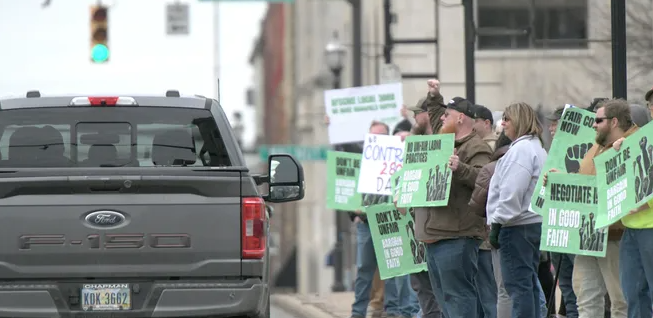Shane Poole never imagined turning his back on the military life he cherished. A dedicated Air Force veteran now serving as a civilian trainer, Poole once took pride in his service and his team of 77. But his unwavering commitment shattered as trust in the government crumbled.
With President Donald Trump aggressively pushing a now-or-never buyout for federal workers—and Democrats seemingly unable to stop him—Poole felt he had no choice but to walk away.
He is just one of an estimated 60,000 federal employees who have accepted the unprecedented buyout, now hanging in the balance as it awaits a court ruling on Monday.

More than a dozen federal employees shared their dilemmas with USA TODAY—torn between staying or leaving. Yet, few were willing to speak on the record, fearing retribution or the possibility of their buyout offers being revoked if they went public.
For many, the decision is agonizing. They must weigh their mortgages, healthcare, and college tuition against the risk of walking away with nothing if they stay—especially as the administration doubles down on threats of furloughs and layoffs.
This sweeping buyout initiative is part of billionaire Elon Musk’s push to shrink and streamline the federal government through the Department of Government Efficiency, or DOGE—a task force created by Trump following his 2024 re-election.
On Tuesday, the administration issued a stark warning: federal employees who refuse the buyout could face furloughs, as “the majority of federal agencies will be downsized,” with the Defense Department being the lone exception.
A massive decision loomed over more than two million federal employees nationwide: by Thursday’s end, they had to decide—resign or stay. But hours before the deadline, a federal judge halted Trump’s buyout plan, allowing labor unions to mount a legal challenge.
Beyond Washington: The Human Cost of the Buyout
While the image of federal workers often centers on Washington bureaucrats, the reality is different. Over 80% of federal employees serve outside the D.C. metro area, according to March 2024 data from the Office of Personnel Management.
These workers aren’t just pushing paper in government buildings—they’re staffing veterans’ hospitals, running research labs, delivering mail, inspecting food and mines, safeguarding national parks, and providing essential small business loans. They have served across administrations, regardless of political shifts.
‘Tired of Being Threatened’
Tony Yang, a 51-year-old IT specialist for the U.S. Department of Agriculture in Minnesota, faced a heartbreaking choice. Rather than endure a grueling 125-mile commute each way under Trump’s return-to-office mandate, he opted for early retirement—despite knowing he’d lose about $1,000 per month in pension benefits.
At first, his wife urged him to hold onto the security of a federal job, worried about mortgage payments and credit card bills. But after many late-night conversations, they decided the buyout—offering eight months of pay and benefits—was the best path forward.
“It was a hard choice. Honestly, I love my job and didn’t want to leave yet,” Yang admitted. “But I feel like I have to settle for this.”
Shane Poole faced a similar dilemma. Recently promoted and still on probation, he feared his job was on the chopping block. With the deadline looming, he took the buyout.
“I figured walking out with something was better than risking everything,” he said. “A lot of people think this is a bluff. Maybe it is. But even if they stiff us, at least I won’t be leaving with nothing.”

‘The Bridge Is Burned’
Shane Poole considers himself one of the lucky ones. With two postgraduate degrees, no debt, and a solid savings cushion, he’s already landed two job interviews just a week into his job search.
But as he sees it, the government is losing exactly the kind of high-performing, highly marketable employees it can’t afford to lose.
Even if the court blocks his resignation, Poole says he’s leaving.
“I can’t trust them anymore. To me, the bridge is burned,” he said. “It’s tough to admit, after serving my country for so long. But I’m over it—and I’m tired of being threatened every time I walk into work.”
A Decision Under Pressure
Federal workers nationwide agonized over their choices as their inboxes filled with increasingly urgent emails from the Office of Personnel Management and agency leadership.
One final memo, received Thursday before the judge’s order, made it clear: “There will NOT be an extension of this program.”
Employees grumbled about being given just one week to make a life-altering decision. Some, like those at the Department of Homeland Security’s Cybersecurity and Infrastructure Security Agency, were only informed the day before the deadline that they even qualified for the buyout.
“This is a deeply personal decision, and whichever decision you make, we support you,” read an email from one agency.
A Weekend of Uncertainty
A last-minute court order gave federal employees an extra weekend to reconsider, but it did little to quell the skepticism. Across government offices, many questioned whether the administration even had the legal authority to follow through on its threats.
Some employees worried the Trump administration wouldn’t honor the buyout agreement. Others balked at a provision requiring them to waive their right to pursue legal or administrative action. Many were uneasy that they weren’t allowed to ask questions in writing.
With trust eroded and stakes higher than ever, thousands of federal employees faced a painful dilemma: take the deal and walk away, or stay and risk everything.
A Job Market on the Brink
A Health and Human Services employee, speaking anonymously to avoid retaliation, voiced deep concerns about the uncertain job market. With thousands of former federal workers potentially flooding the market just as private companies cut jobs across multiple industries, she fears a grim economic ripple effect.
“I can only conclude that this will lead to mass unemployment, fewer opportunities, lower pay, and immense economic strain across the country,” she said.
Despite mounting pressure—some agencies have warned that layoffs are inevitable if not enough employees accept the buyout—she and her husband, both federal workers, refuse to walk away. Their work serves the American people, and they simply can’t afford to leave, with a mortgage, student loans, and other financial responsibilities hanging over them.
Her fears were echoed by a longtime U.S. Forest Service employee, who questioned how workers would explain their sudden departure to future employers.
“How does a solid 20-year employee—or anyone, really—convince a private employer why they just lost their job?”
With uncertainty looming and trust in the administration eroding, many federal employees are left wondering whether staying is a risk worth taking.
A ‘Taboo Topic’ in Federal Offices
At the Environmental Protection Agency, talk of the buyout has become almost nonexistent—not because employees aren’t thinking about it, but because they’re afraid to discuss it.
Even if the offer turns out to be legally questionable, many fear that staying could mean getting fired and walking away with nothing.
Labor unions have strongly advised federal employees against accepting the buyout, especially with Congress only funding government operations through mid-March, adding another layer of uncertainty.
“I can tell you it’s been almost a taboo topic,” one EPA employee admitted. “I think people are afraid to admit if they’re taking it because there’s this feeling that we’re about to get suckered.”
With trust at an all-time low and the stakes higher than ever, federal workers are left in a tense limbo—unsure whether to take the deal or brace for what comes next.




